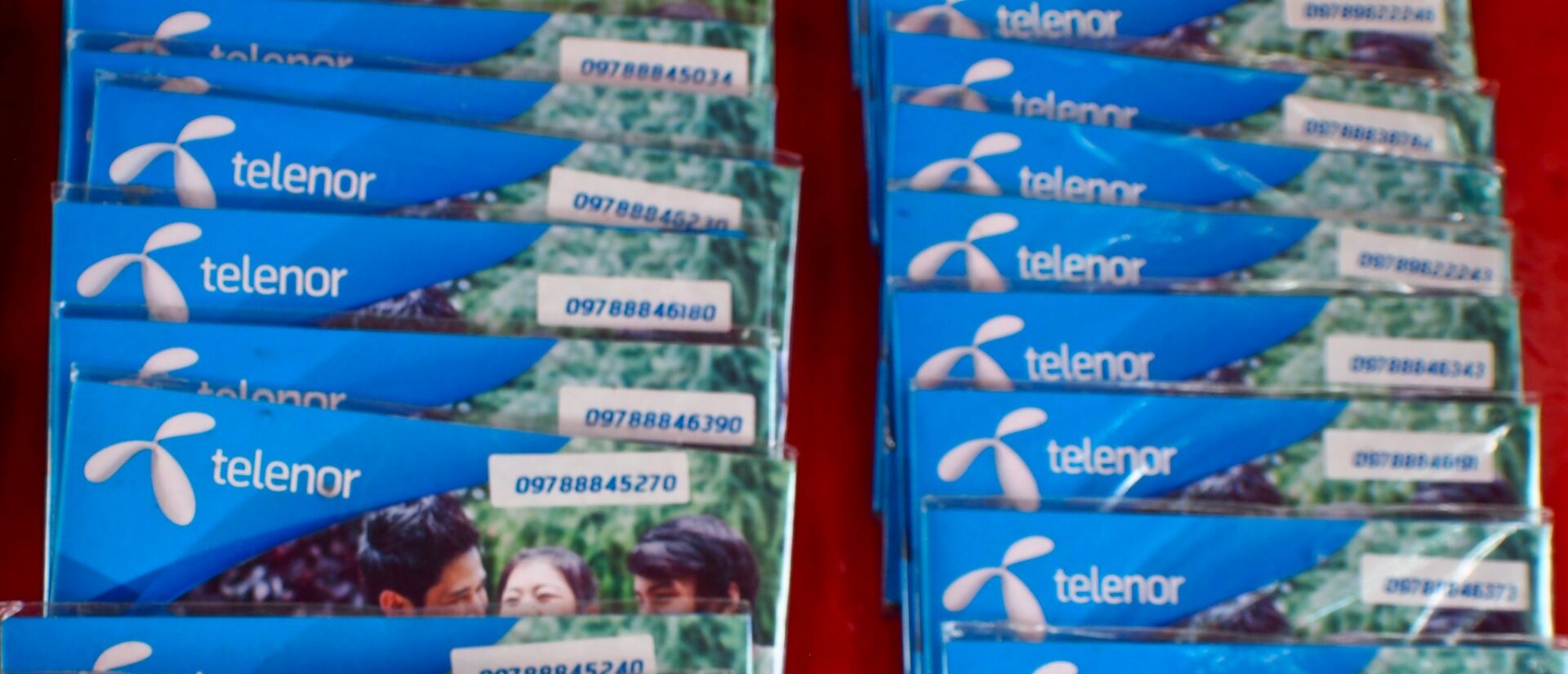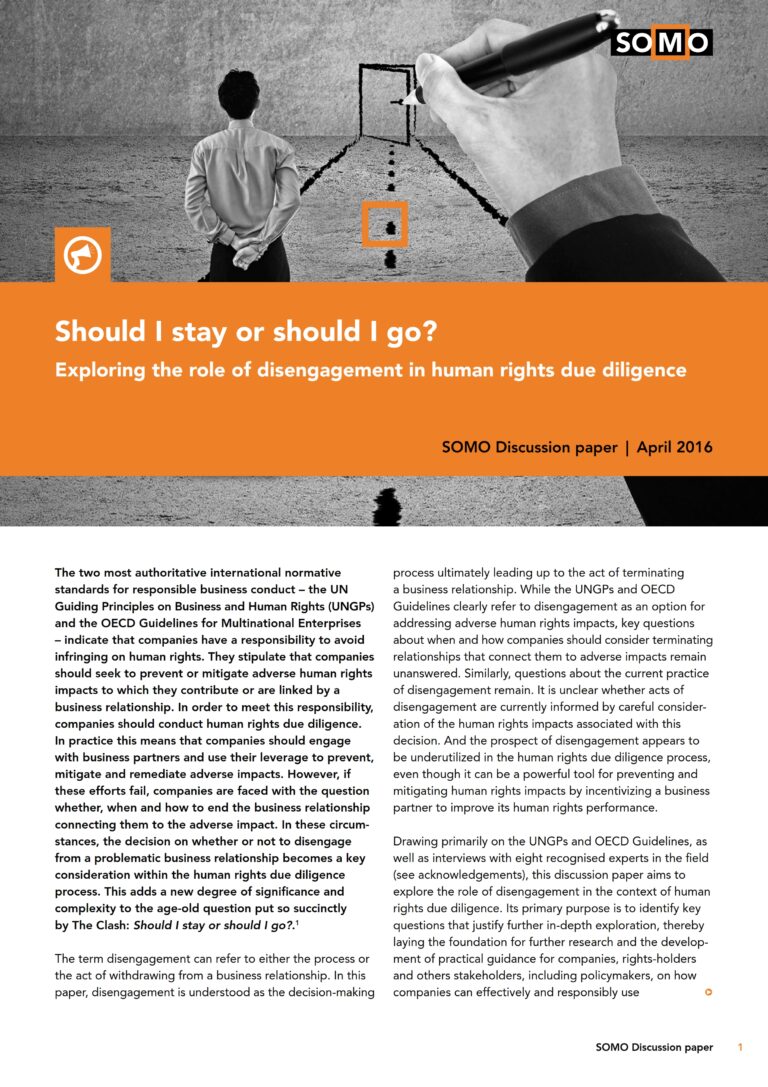
Complaint against Telenor for irresponsible disengagement from Myanmar
Hundreds of Myanmar-based civil society organisations submitted a complaint with Norwegian authorities against telecom multinational Telenor for putting the security and human rights of the Burmese people at risk as it rushes to sell its activities in Myanmar.
The complaint(opens in new window) — filed at the Norwegian National Contact Point for the OECD Guidelines for Multinational Enterprises by 474 Burmese civil society organisations and supported by SOMO — contends that Telenor’s sale of its Myanmar business to M1 Group fails to meet the standards of responsible disengagement set out in the OECD Guidelines, in three key respects:
- Telenor has failed to conduct appropriate risk-based due diligence and has failed to seek to prevent or mitigate adverse human rights impacts potentially arising from the sale of its Myanmar operations.
- The Norwegian company has failed to meaningfully engage with relevant stakeholders in relation to the sale of Telenor Myanmar to M1 Group, including the Myanmar-based civil society organisations endorsing the complaint.
- Telenor has not been transparent in relation to its decision to disengage from its Myanmar operations.
Telenor’s sale to M1 Group comes after the Myanmar military’s February 1, 2021, military coup and brutal crackdown on peaceful protests, civil society and independent media, as well as heightened electronic surveillance. M1 Group is a Lebanese company owned by the billionaire Mikati family, who have a history of business in countries with authoritarian regimes including Syria, Sudan and Yemen, as well as unresolved allegations of corruption and terrorist financing. M1 Group was identified by the 2019 UN Independent International Fact-Finding Mission on Myanmar as having financial links to the Myanmar military as a result of their investment in an infrastructure company that has commercial ties to a Myanmar military mobile operator.
“In Myanmar, our life is now at risk from the military junta’s terrorism and their increasing surveillance,” said Ko Ye, a Myanmar activist who is part of the complaint. “We need responsible telecommunications businesses that can push back rather than willingly collude with the junta. We have no trust that M1 Group will uphold their human rights responsibilities or do business with integrity. We are shocked that Telenor is rushing to sell their Myanmar business to such unscrupulous buyers without human rights due diligence, transparency or stakeholder engagement. We ask the OECD National Contact Point in Norway to urgently consider our complaint against Telenor. The sale to M1 Group must be suspended before it leads to more killings and torture.”
SOMO Senior Researcher Joseph Wilde-Ramsing said, “Norwegian companies have a global reputation for acting responsibly. That’s why it is so disappointing to see Telenor disregard the OECD Guidelines and UNGPs and put the human rights and security of the Myanmar people at severe risk through its irresponsible disengagement from the country. When entering risky contexts like Myanmar, companies like Telenor should be mindful of more than just profits and be prepared with a responsible exit plan. Telenor’s lack of due diligence and preparation does not give it license to leave the people of Myanmar in the lurch.”
Diego Alexander Foss, Advisor on responsible business and investment at the Norwegian forum for development and environment (ForUM(opens in new window) ) said, “We understand that Telenor is in a very complex situation and that there are no easy solutions. But we still expect all Norwegian companies to perform due diligence in all their operations, including when they wish to sell down. The fact that Telenor is a state-owned company makes the lack of transparency and dialog with relevant parties even more concerning”.
OECD Guidelines
The OECD Guidelines for Multinational Enterprises(opens in new window) are the world’s most comprehensive, internationally recognised, government-backed standard on responsible business conduct. The Guidelines comprise governments’ expectations of business across a range of issues such as human rights, labour rights, and the environment. The OECD Guidelines contain a unique grievance mechanism to address complaints of corporate misconduct, the National Contact Point system. When disengaging from business relationships, the OECD Guidelines are clear that companies should “consider and address the potential adverse impacts of a decision to disengage” on the human rights of local stakeholders.
SOMO and ForUM are both members of OECD Watch, a global network of civil society organisations that aims to hold corporations and governments accountable for their impacts.
Check out the complaint(opens in new window) in the OECD Watch complaints database.
Do you need more information?
-

Joseph Wilde-Ramsing
Advocacy Director
Partners
Related content
-
Posted in category:Publication

-
Responsible disengagement in the time of corona Published on:
 Joseph Wilde-RamsingPosted in category:Publication
Joseph Wilde-RamsingPosted in category:Publication Joseph Wilde-Ramsing
Joseph Wilde-Ramsing -
Should I stay or should I go? Published on:
 Joseph Wilde-RamsingPosted in category:Publication
Joseph Wilde-RamsingPosted in category:Publication Joseph Wilde-Ramsing
Joseph Wilde-Ramsing

